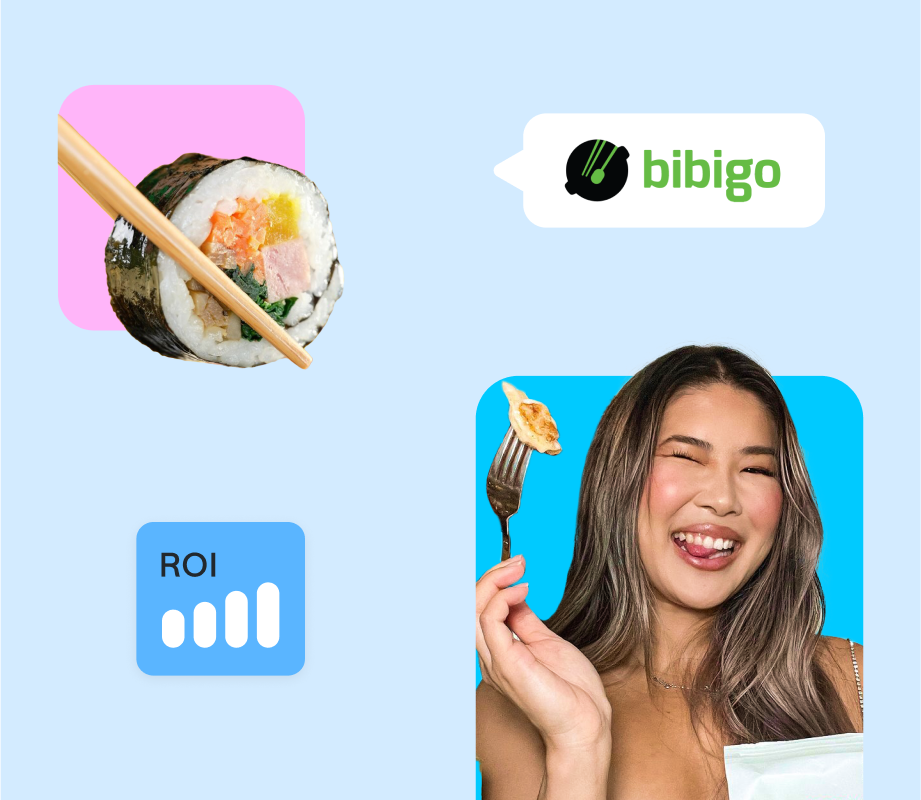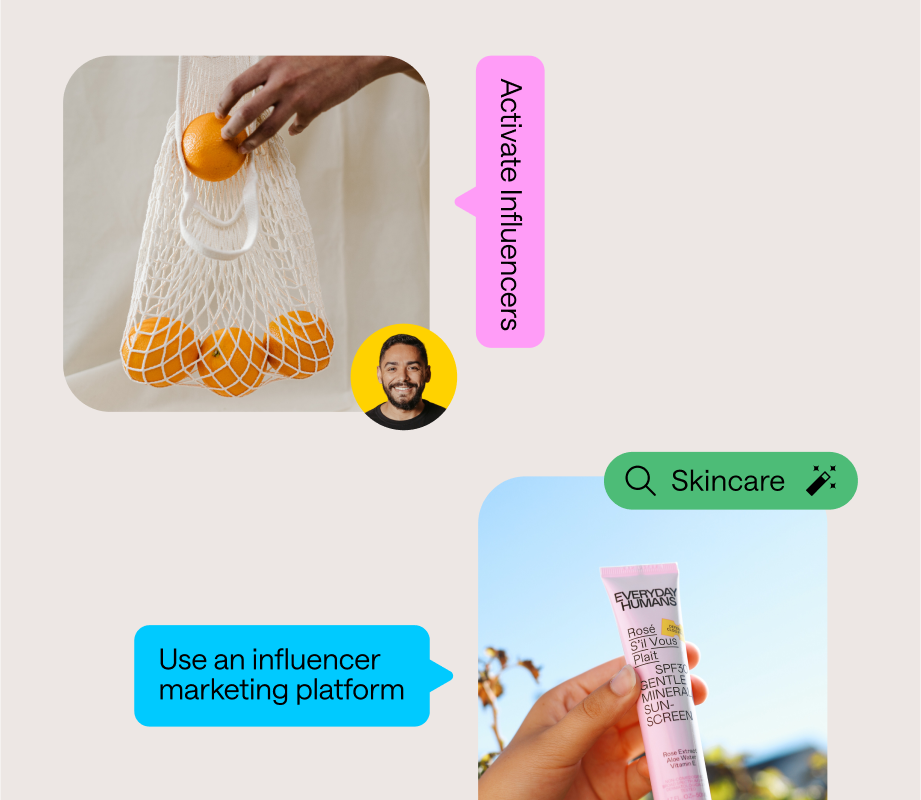Influencer marketing for restaurant brands is one of the most effective ways to bring buzz, bookings, and brand loyalty to your eatery. In a world where diners discover their next meal through Instagram Reels, TikToks, and foodie reviews, partnering with creators can turn mouthwatering content into fully booked tables. Find out how Later can help you leverage social media influencers to bring in customers.
Get on the radar and into the feeds of hungry customers. Use Later to run restaurant influencer campaigns that drive real traffic. Schedule a demo now.
Table of Contents
- What is influencer marketing for food brands?
- How to get influencers to come to your restaurant
- What is the best marketing strategy for restaurants?
- How can influencer marketing potentially impact a restaurant's corporate reputation?
- 3 examples of influencer marketing for restaurant brands in action
- Types of influencers for restaurant brands
- Grow your restaurant with influencer marketing
What is influencer marketing for food brands?
Partnering with online influencers is an increasingly popular way for brands to market to new audiences. In the context of food service, influencer marketing for restaurants and food brands tends to focus on three particular groups:
Local creators: Influencers with a local following are critical to building awareness and trust within the local community most likely to visit your restaurant.
Foodies: Authentic endorsements of your menu items from food-focused influencers are a great way to promote the quality of your restaurant.
Hospitality and lifestyle influencers: Creators who speak to the overall experience of visiting a restaurant help to establish you as a must-visit destination.
There are also types of influencer marketing campaigns to consider. Paid partnerships and collabs, for example, are often covered by contractual agreements that need to be worked out in advance so that all parties understand their roles and responsibilities. Gifting—sending a product or comping a meal for review, for example—or events, on the other hand, are often one-off arrangements without any long-term agreements.
Ultimately, all of these tools in the influencer marketing toolbox can promote your restaurant brand. That's where Later's versatile, scalable influencer marketing platform and full suite of influencer marketing services are essential.
How to get influencers to come to your restaurant
Successful influencer marketing builds on the trust and authenticity implicit in an influencer's relationship with their audience. As such, it's important to find influencers who can authentically represent the values of your brand to your potential customers. With restaurant brands, this often raises an issue: how to get influencers to physically come to your establishment?
Some restaurants find success by crafting irresistible invites or PR drops, winning influencers over by sheer force of (brand) personality. Tasting events and media nights can be effective vehicles for attracting influencers, especially if they offer special details for the audience, such as a sneak peek at upcoming menu items or ideas for new cocktails.
One-off free meals can be a good start but won't deliver the same sustained, consistent brand visibility that comes from regular communication. Think about building long-term relationships with influencers by hosting regular events, check-ins, and updates on menu developments.
Later's find influencers tool can help you quickly identify influencers who align with your brand across industries and platforms. Our influencer outreach tools can help you connect quickly and build the relationships you need to elevate your influencer marketing campaigns.
What is the best marketing strategy for restaurants?
Influencer content outscores traditional advertising for engagement, trust, and brand-building—cornerstone qualities for restaurant brands. But influencer marketing campaigns, traditional ads, and paid social campaigns are all elements of a strong marketing mix.
Active social and influencer activities will often generate organic user-generated content (UGC), which you can amplify across your platforms. Events also help to build visibility and provide content opportunities for your marketing channels.
An active and varied social media marketing strategy can also hook influencers and your target audience with seasonal menu launches and promo for new store openings. Responsiveness to reviews and UGC helps with reputation building and management.
All of this can be a lot to manage manually. Later's influencer campaign platform can help you coordinate all aspects of your influencer marketing at scale.
How can influencer marketing potentially impact a restaurant's corporate reputation?
Influencer marketing is one of the top ways to leverage social proof: the idea that people are influenced by the thoughts and actions of others when making decisions. Social proof can be a powerful tool for building credibility with a new audience. It's typically expressed in the form of reviews, endorsements, and UGC—all of which a successful social media and influencer marketing campaign is likely to generate.
Conversely, however, an unmoderated or poorly managed partnership can quickly ruin a corporate reputation. An influencer's bad behavior can reflect poorly on your brand, and the same social media platforms that carry good news to a wide audience are also capable of quickly spreading damaging material.
One way to effectively mitigate the risk of a partnership going awry is to establish clear influencer guidelines and contracts from the outset. Avoid future misunderstandings by creating a single, straightforward document that outlines expectations for deliverables and on-brand creator content.
As your influencer community grows, you can manage communications and content with Later's influencer management platform.
3 examples of influencer marketing for restaurant brands in action
Here are some examples of successful influencer marketing for restaurant brands from Later's extensive collection of case studies.
1. El Pollo Loco ramps up with a new menu item
El Pollo Loco is the USA's leading fire-grilled chicken restaurant. The brand had a new menu item to promote—the Double Tostada—and a desire to build on previous influencer campaigns by going bigger and better than before. Past campaigns had mainly focused on TikTok and used between five and 10 influencers. This time around, El Pollo Loco relied on Later to assemble a group of influencers, ranging from foodies to comedians and lifestyle bloggers, who operate on both TikTok and Instagram.
Furthermore, thanks to Later Influence's streamlining of the campaign management process, the brand team was able to focus resources more effectively on maximizing partnerships with local influencers within specific markets.
The campaign generated 39 pieces of content that pulled in a whopping 46.7 million impressions. A 2.2% average engagement rate was the basis of record product trials. El Pollo Loco intends to continue expanding its influencer marketing program into new niches, supported by a diverse range of creators.
2. Crumbl crushes its brand-building goals
Crumbl Cookies turned to Later and influencer marketing as the ideal way to turn their traditional end-of-year slow period into a jolly holiday seasonal upswing. Using Later's tools and expertise to find influencers, the brand picked five content creators, each with their own niche and target audience on TikTok. Crumbl then developed content with each influencer, using the Later influence platform to manage content review and approvals.
The results were stunning: 17 pieces of influencer-generated content garnered 39.7 million impressions and 175.5K engagements. The earned media value for the campaign totaled $1.2 million.
3. Habit Burger & Grill gets big results from the Big Game Weekend
Habit Burger & Grill is a regional franchise with national ambitions. The brand saw the 2025 Big Game Weekend in New Orleans as an ideal opportunity to build some buzz and reach a target audience of burger lovers who weren't familiar with Habit's award-winning Charburger.
Habit sent six TikTok and Instagram influencers and two food trucks to New Orleans for the Big Game. The creators roamed all over the city, popping up at events, creating highly engaging content as they scoured the streets for "Operation: Find the #1 Burger Fan."
Collectively, the creators generated 44 pieces of content that picked up 10.5 million impressions and 186K total engagements. Not bad for a campaign that was put together in just 72 hours, from creator contracts to travel coordination and on-site team deployment.
Types of influencers for restaurant brands
All three of these food brands developed campaigns based around a diverse range of influencers. Each brand assembled a distinct influencer mix for reasons unique to their own strategic goals and priorities, but they were all clear in their aim to target a range of creators to connect with different niche audiences.
Restaurant brands can benefit from a surprisingly wide range of influencer types. For example, many restaurants operate in a fixed location, serving a particular neighborhood or community. This can make working with local micro-influencers (creators with follower counts ranging from 5,000 to 50,000, depending on the overall market size) rewarding. Micro-influencers often speak to small, highly engaged communities that interact more actively and positively with recommendations and endorsements than members of larger, more loosely connected groups.
Applying a wider lens, lifestyle and food content creators with large followings on Instagram and TikTok can be excellent partners for developing viral content that distributes to wide audiences as Reels or review posts.
Depending on your restaurant's concept, there may be particular lifestyle creators who align well with your brand, such as family, vegan, or travel influencers.
Later's analytics platform lets you continuously gather real-time data from all your influencers and campaigns. You can regularly refine and adjust your influencer mix to ensure you're reaching the right potential customers with the most effective content.
Grow your restaurant with influencer marketing
Influencer marketing is one of the most effective ways to drive real-world foot traffic and digital reach for restaurant brands. The trust and authenticity that creators share with their audiences make for engaging and credible recommendations for matters of personal preference, such as a favorite restaurant or menu item.
Later Influence amplifies the power of influencer marketing for restaurant brands by streamlining the process of developing and managing scalable creator campaigns. Instead of one giant campaign for all your potential customers, you can run several smaller campaigns to select target audience niches, with continuous monitoring and tracking of outcomes and results.
See for yourself how effectively you can grow your sales with trusted influencers: Book your Later influencer marketing demo today.




